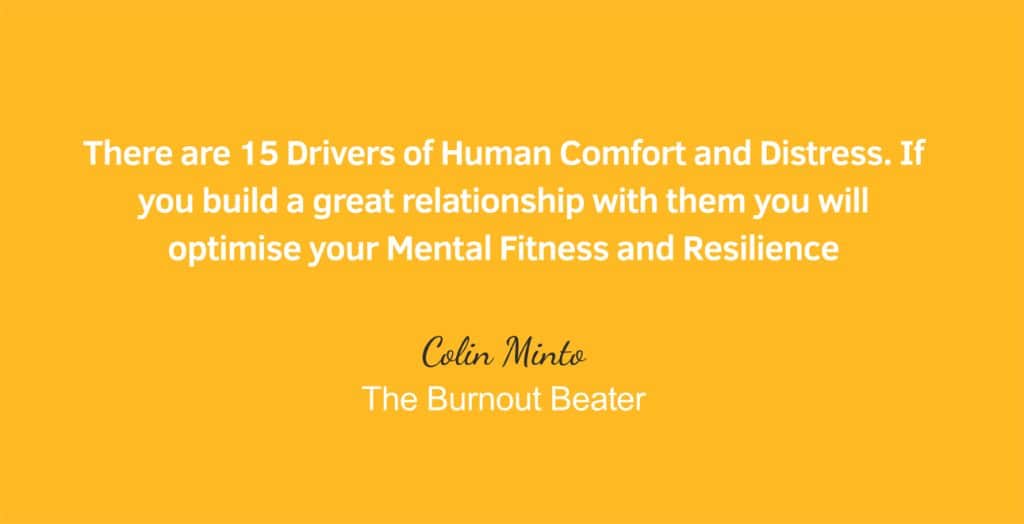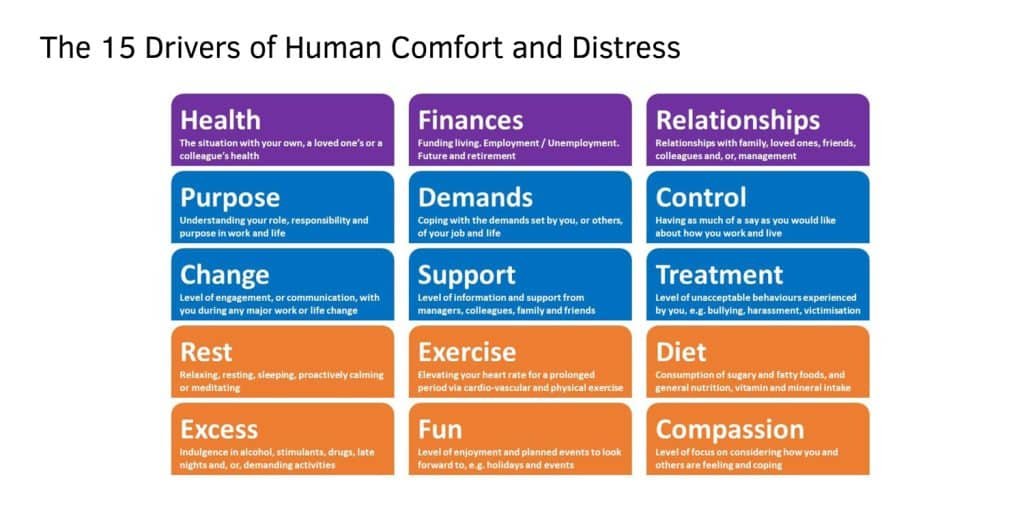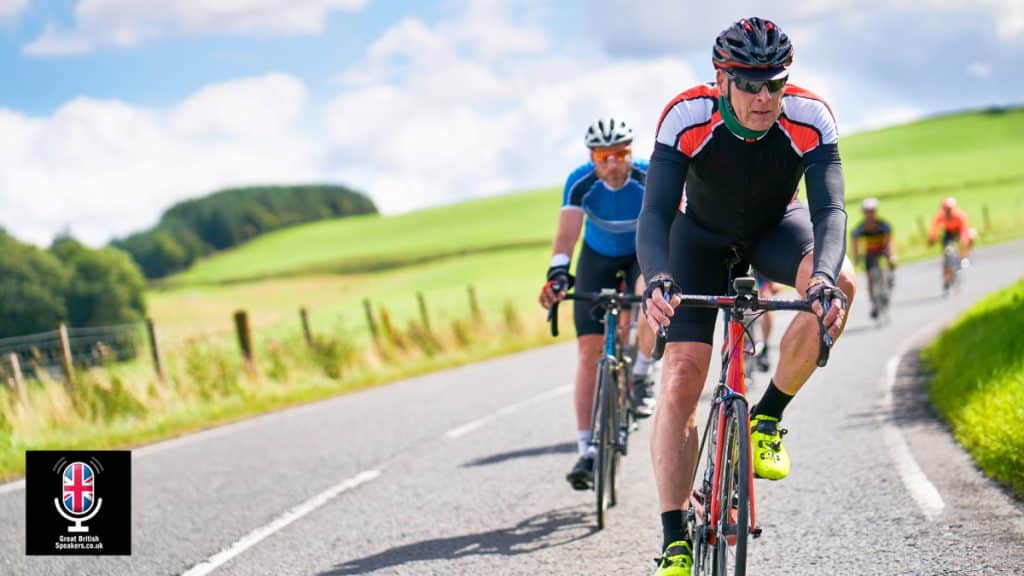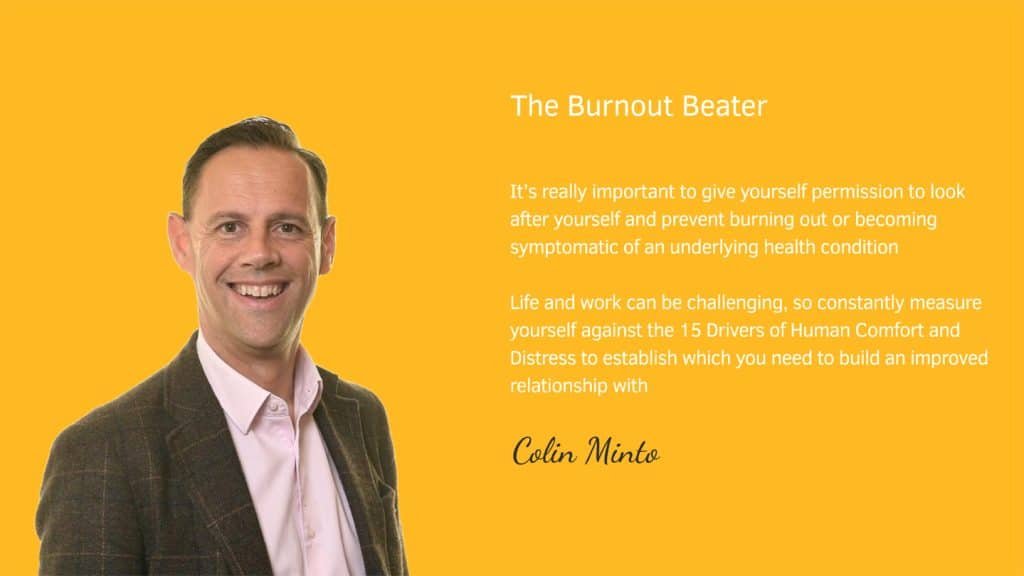Other Articles





Working with Colin has taken all of our conversations on this critical topic to the next level, and I look
Paul Bowles – VP Global Talent Acquisition & Onboarding, Nokia
forward to working together with him again.
Thank you Colin – you have been a massive influence on us all.

“The performance of people drives results, improves profits, gets businesses the highest valuations, and satisfies stakeholders. Resilient and engaged employees are healthier, happier, stay longer, outperform expectations, and celebrate employer brands, EVP’s and cultures to their networks.”
Colin uses his own personal and professional experience in workplace stress and burnout to help others experiencing the same, through a number of offers:
To help decide how best to approach burnout beater Colin Minto’s offering call Great British Speakers on 01753 439289 to discuss your delivery options
Colin has a number of keynote topics he can talk about, each individually tailored for his client. Example subjects include:
Colin is an architect of an exclusive model core to the Burnout Beater concept, that educates people on the 15 drivers of pressure and stress. He first shocks, then teaches, audiences on how to build a positive relationship with all 15 drivers, and provides techniques to use them to build resilience.

Colin Minto the Burnout Beater on Health: The situation with your own, a loved one’s, or a colleague’s health
If you have concerns over your own health, the health of a loved one or colleague, don’t delay! It’s important to speak to a GP or immediately.
If the recovery journey is tough, embrace it as a challenge. If the prognosis is not good, make peace with it as soon as you can, accept it, and invest everything you have into maximising your life.
Finances: Funding living. Employment/Unemployment. Future and retirement
Financial difficulties affect everyone at some stage in their life, and so it’s important to regularly do something positive with them.
Frequently audit your finances, especially at times of real challenge.
Do you need to speak to a bank or financial support company?
List out all of your expenditures so you can fully understand what is coming and going out.
Establish if you can amalgamate any of them.
Can you rationalise all of your outgoings?
Can you earn more?

Life revolves around the relationships we keep, and unfortunately not all of them are good. Some relationships peter out as you age, some weaken as new life stages are met, e.g. promotions, marriage, parenthood, but some are only strengthened with time.
If you have any poor relationships, take some time to think them through and understand why they are poor. Are you able to mend broken relationships? Is it healthy to maintain these poor relationships? Would you be better off moving on? Embrace the upsides of improving relationships, but don’t regret not making amends.
It is important to have a purpose in both your personal and professional lives. Without it, your anxiety will build.
Establish with your family and friends what your role is, what they expect from you. if you are comfortable with it, play that role. In a professional environment, you will have a job description, so make sure the job you are actually doing is as described. If not, talk to a manager to formalise what your professional purpose is. By knowing your purpose in both situations, you will feel more able to do what you can to the best of your ability.
Do you consciously make the decision to overdo it?
Does your boss consciously tell you to overdo it?
Do your friends and family ask you to overdo it?
We are often our own worst enemy, assuming we must work harder than is actually expected by anyone.
You need to give yourself permission to ease your load; work with your manager to agree what is expected from you and by when. Make sure you carve out at least 20% down-time in life and work to recharge, recuperate, and regroup. By ensuring you have “Me Time” and lowering the demands on your time, you will deliver more and you will deliver better.
It’s the hard truth that sometimes we just can’t control things. But it can be hard to accept that.
That is the most important thing! If there are things you absolutely cannot control, you need to accept it and move on. It is far more productive if you put your energy towards the things you can control. If you think you don’t have as much control over things you believe you can help with, then speak to others involved and offer input. Don’t be shy; take control.
Since the pandemic, our “normal” has disappeared. In fact, there is no real “normal” now. And we must accept that. We must expect, and accept, change.
Change makes people apprehensive and can increase anxiety and stress levels, but if you’re the one in charge of the change, and you communicate effectively through this change – by explaining why and how, keeping people up to date, and analysing the #outcome – you will optimise the process, the outcomes, and the positive impact on people’s wellbeing.
But what if you’re the recipient of the change, and you’re not in control of it? Then ask for the above from the person in charge. If you don’t ask for it, you won’t receive it. Be open and honest and ensure a seamless communication.

Human beings are community-based creatures; therefore, it is essential to surround yourself with people that can support you.
A challenge shared is a challenge halved, and the benefit of other people’s experiences will fast-track you to a solution. Build as much diversity as you can in your support group, and embrace everyone’s contribution, because often the best learning comes from exposing yourself to very different opinions and ways of approaching things.
No matter who you are, you deserve respect; you deserve to be treated well. However, in some situations you will be treated poorly. Please note this is not your fault. The person treating you poorly is the one at fault.
It’s important that you don’t feel ashamed or intimidated, that you feel comfortable in speaking to the individual about how they’re making you feel, or to escalate it to an appropriate person in order to find an alternative form of treatment that will have a more positive outcome for all. It is not always possible to bring someone completely to your way of thinking, and vice versa, sometimes you will have to compromise and agree to meet in the middle.

We often think that rest is a bad thing, that if we are “doing nothing”, then we are wasting time. This is wrong. Sleep and rest are as essential to us as food, water, and exercise. It is important to prioritise taking as much “me time” as possible, otherwise your drive and threat systems will overheat and breakdown.
Sleeping, breathing exercises, country walks, meditation, yoga, mindfulness, Pilates, reading etc. are all forms of rest and will help you recharge your batteries. Imagine a pressure gauge nearing ‘red’, about to blow. By doing one, or some, of these resting exercises, this gauge will move down, eventually making its way to green. Invest in your downtime and you’ll find an improvement in all aspects of your life.

As important as rest is, exercise and movement are as vital as sleep, hydration, and nourishment.
Incorporate physical activity into your routine, such as cycling, gym work, dancing, swimming, running, or team sports. These will help you burn off adrenaline and build your physical fitness, which, in-turn, supports mental fitness. If you’re not a fan of exercising, pick something you do like; keep doing it and it will become habitual and you will start to enjoy it, and you will start to see the benefits in terms of mental fitness, physical fitness, weight loss, gut health, and overall happiness.
Maintaining a nutritious and healthy diet is fundamental, not only for physical health but for cultivating mental fitness and resilience.
The food you consume directly impacts your brain functions, mood regulation, and cognitive abilities. A balanced diet rich in nutrients, vitamins, and minerals will provide your brain with the fuel it needs to function at its best. Foods such as fruits, vegetables, lean proteins, whole grains, and healthy fats will support the production or neurotransmitters responsible for mood stability and stress management. That’s not to say you can’t indulge in your favourite sweet treats now and again, but by balancing it with wholesome foods, you not only enhance your ability to cope with stress and adversity but also build your resilience of life’s challenges, fostering a stronger mind.

Drinking, eating, and partying are all good experiences, but moderation in these things is crucial for mental fitness and resilience.
Excessive indulgence can impair cognitive function, disrupt sleep, and exacerbate mood swings, making you more susceptible to stress and other mental health issues. Overeating can lead to weight gain and decreased energy levels, further affecting your cognitive abilities. Also, excessive partying can disrupt your sleep patterns and often expose you to risky situations, thus adding to stress levels and reducing your resilience. Prioritising moderation and self-care helps maintain a balanced lifestyle conducive to mental well-being, enabling better coping with life’s challenges
Engaging in enjoyable activities is essential for stimulating your brain’s reward system, which in turn releases feel good neurotransmitters like serotonin and dopamine, which help elevate your mood and reduce stress levels
These positive emotions not only provide immediate relief, but can also contribute to long-term resilience by building emotional strengths. Fun activities often involve social interaction which helps fosters connections with others and provides a support network. Taking time for leisure allows you to recharge your mental batteries, enhance creativity, and gain perspective on challenges.
By practising compassion, we can enhance our mental fitness and resilience by fostering connection and support, reducing feelings of isolation, and promoting a sense of purpose.
Compassion shifts focus away from personal challenges and provides perspective and resilience. Acts of kindness release serotonin and oxytocin, both in yourself and the person you are extending compassion to, reducing stress levels, and promoting relaxation. Integrating compassion into your daily life improves mental strength, enabling individuals to navigate life’s challenges more effectively.

The Burnout Beater Colin’s client list is like a who’s-who of top businesses, and includes:

The testimonials from previous clients speak for themselves:
“Your style is so personal and impactful. Thank you for enlightening us and paving the way for others.”
“Thank you Colin for such an inspiring session, your transparency made the topic and concepts so relatable.”
“Thank you for such an incredible session and for being so transparent about your journey – it’s inspiring. I think we’ve all walked away with some great takeaway points.”
“Brilliant session Colin. Definitely had a few light bulb moments. It’s amazing to see the fine line between different conditions. What I found exceptionally inspiring was your ability to be brutally honest about your own journey in the hopes of helping others.”
“Colin shocks audiences with his journey, then educates everyone on optimising their mental fitness and resilience to survive and thrive in today’s world.”
Want to find more about Colin? – then take a look at his speaker bio page HERE
It is vital that you give yourself permission to look after yourself physical and mentally, preventing burning out or becoming symptomatic of an underlying health condition.
Life and work is challenging, so it’s important to measure yourself against the 15 Drivers of Human Comfort and Distress to establish what you need to build on.
And if you need further help for yourself or your workforce, we would be delighted to hear from you.



